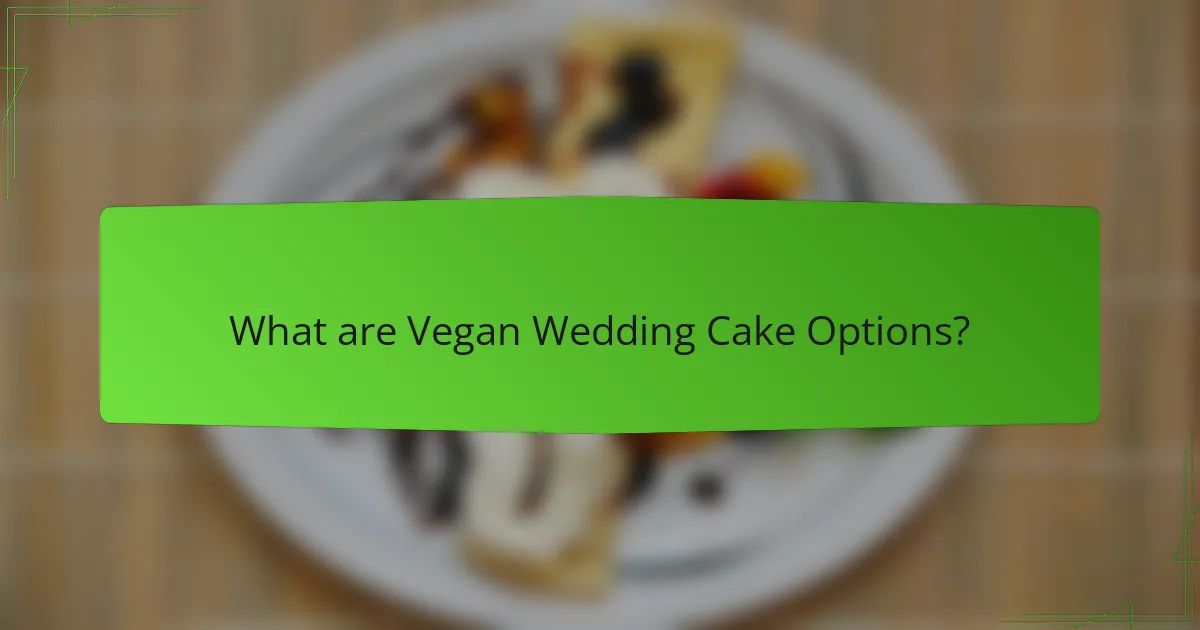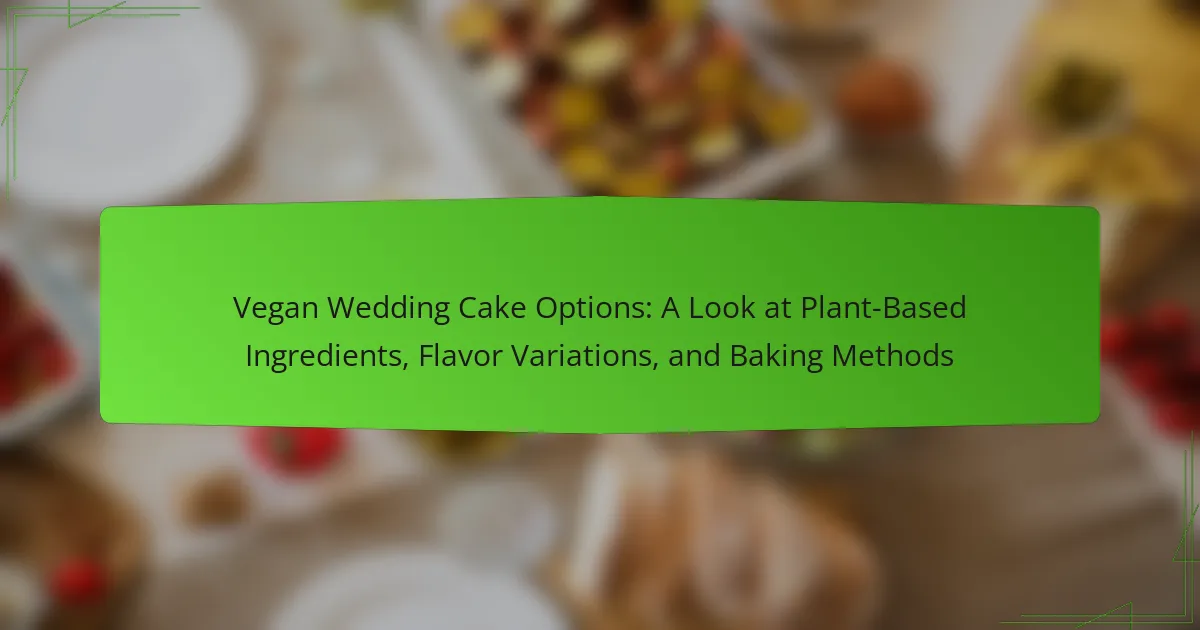
What are Vegan Wedding Cake Options?
Vegan wedding cake options include cakes made without animal products. Common plant-based ingredients are almond milk, coconut oil, and flaxseed. These alternatives replace eggs and dairy in traditional recipes. Popular flavors for vegan wedding cakes are chocolate, vanilla, and carrot. Some bakers offer gluten-free options as well. Many vegan cakes use natural sweeteners like maple syrup or agave nectar. A variety of frostings, such as coconut cream or vegan buttercream, can complement these cakes. Vegan wedding cakes are increasingly available at specialty bakeries and online.
How do plant-based ingredients contribute to vegan wedding cakes?
Plant-based ingredients are essential for creating vegan wedding cakes. They replace traditional animal-based components like eggs and dairy. Common substitutes include almond milk, coconut oil, and flaxseed. These ingredients provide moisture and binding properties. For example, flaxseed mixed with water can mimic egg’s binding effect. Plant-based sweeteners like agave syrup or maple syrup offer sweetness without refined sugar. Additionally, fruit purees such as applesauce can enhance flavor and texture. The use of plant-based ingredients also aligns with ethical and environmental values. This contributes to the popularity of vegan wedding cakes among eco-conscious couples.
What are the most common plant-based ingredients used in vegan wedding cakes?
The most common plant-based ingredients used in vegan wedding cakes include flour, sugar, plant-based milk, and vegetable oil. Flour serves as the main structure for the cake. Common choices are all-purpose, almond, or coconut flour. Sugar provides sweetness and is often cane or coconut sugar. Plant-based milk, such as almond, soy, or oat milk, acts as a liquid component. Vegetable oil, like canola or coconut oil, adds moisture and richness. Other common ingredients include applesauce or flaxseed meal as egg substitutes. These ingredients together create a delicious and moist cake suitable for vegan diets.
How do these ingredients compare to traditional cake ingredients?
Vegan cake ingredients differ significantly from traditional cake ingredients. Traditional cakes often use eggs and dairy, which contribute to moisture and structure. Vegan cakes substitute these with plant-based ingredients like applesauce, flaxseed, or aquafaba. These substitutes can provide similar moisture and binding properties.
For example, applesauce adds moisture and sweetness, while flaxseed creates a gel-like consistency when mixed with water. Additionally, traditional cakes typically use refined sugars, whereas vegan cakes may utilize alternatives like coconut sugar or maple syrup. These alternatives can offer distinct flavor profiles and lower glycemic indexes.
Overall, vegan ingredients can produce cakes that are equally delicious and satisfying as their traditional counterparts.
What flavor variations are available for vegan wedding cakes?
Vegan wedding cakes are available in a variety of flavor variations. Common options include chocolate, vanilla, lemon, and red velvet. Other popular flavors are almond, carrot, and coconut. Unique variations can include matcha, chai spice, and lavender. Many bakers also offer seasonal flavors like pumpkin or berry. Each flavor can be enhanced with vegan-friendly frostings and fillings. This variety allows couples to customize their cake to reflect personal tastes and themes. Vegan cakes use plant-based ingredients while maintaining delicious flavors.
Which flavors are most popular in vegan wedding cakes?
The most popular flavors in vegan wedding cakes include chocolate, vanilla, lemon, and red velvet. Chocolate is favored for its rich taste and versatility. Vanilla is a classic choice, often paired with various fillings and frostings. Lemon offers a refreshing citrus flavor that is especially popular in summer weddings. Red velvet is loved for its unique color and subtle cocoa flavor. These flavors cater to a wide range of palates and preferences.
How can unique flavor combinations enhance a vegan wedding cake?
Unique flavor combinations can significantly enhance a vegan wedding cake by creating a memorable taste experience. These combinations allow for the incorporation of diverse ingredients, such as fruits, spices, and herbs. For instance, pairing lemon with lavender can add a refreshing and aromatic twist. Additionally, combining chocolate with raspberry can provide a rich and tangy contrast. Unique flavors can also cater to various palates, ensuring that guests enjoy a variety of tastes. The creativity in flavor pairing can elevate the cake’s aesthetic appeal, making it visually enticing. Overall, unique flavor combinations contribute to a more personalized and enjoyable dessert experience at weddings.
What baking methods are used for vegan wedding cakes?
Vegan wedding cakes can be baked using methods such as traditional baking, steam baking, and microwave baking. Traditional baking involves using an oven to bake the cake at a specified temperature. This method allows for even heat distribution, which is essential for achieving the desired texture. Steam baking uses steam to cook the cake, resulting in a moist texture. This method is particularly useful for denser cakes. Microwave baking is a quicker method that allows for rapid cooking, but it may not provide the same texture as traditional methods. Each method can be adapted to incorporate vegan ingredients while maintaining the integrity of the cake.
How does the baking process differ for vegan cakes compared to traditional cakes?
Vegan cakes differ from traditional cakes primarily in the absence of eggs and dairy. Instead of eggs, vegan recipes often use substitutes like flaxseed meal or applesauce to provide binding and moisture. Dairy milk is replaced with plant-based alternatives such as almond, soy, or oat milk.
These substitutions can affect the texture and rise of the cake. Baking soda and vinegar are frequently used in vegan cakes to create leavening, compensating for the absence of eggs. The mixing method may also vary, as vegan batters often require careful blending to ensure even distribution of ingredients.
Additionally, baking times and temperatures might need adjustment due to the different moisture levels in vegan ingredients. Studies show that vegan cakes can be just as fluffy and flavorful as traditional cakes when proper techniques are applied.
What tips can improve the baking of vegan wedding cakes?
Use high-quality plant-based ingredients for vegan wedding cakes. Opt for fresh fruits, organic flours, and non-dairy milk. Incorporate natural sweeteners like maple syrup or agave nectar. Experiment with egg substitutes such as flaxseed meal or aquafaba for binding. Monitor baking times closely, as vegan cakes may bake faster. Ensure proper mixing to avoid lumps and achieve a smooth batter. Use a toothpick to check for doneness, as vegan cakes can be tricky. Allow cakes to cool completely before frosting to prevent melting.
How can one choose the best vegan wedding cake for their celebration?
To choose the best vegan wedding cake, start by identifying your flavor preferences. Consider popular flavors like chocolate, vanilla, and lemon. Next, evaluate the cake’s texture, which can range from light and fluffy to dense and moist. Research local bakers who specialize in vegan cakes. Look for reviews and testimonials to gauge their quality. Schedule tastings to experience different options firsthand. Discuss dietary restrictions with the baker to ensure all guests are accommodated. Finally, consider the cake’s design and how it fits your wedding theme. A well-chosen vegan wedding cake enhances the celebration while meeting ethical and dietary choices.
What are some common challenges when baking vegan wedding cakes?
Common challenges when baking vegan wedding cakes include finding suitable egg substitutes. Traditional cakes rely on eggs for structure and moisture. Popular substitutes like flaxseed or applesauce may not provide the same texture. Achieving the right balance of flavors can also be difficult. Vegan ingredients sometimes have distinct tastes that require careful pairing.
Another challenge is ensuring the cake holds up during decoration. Vegan cakes can be denser and may not support heavy frosting well. Additionally, moisture retention is crucial. Vegan cakes can dry out faster than their non-vegan counterparts. Lastly, ingredient availability can pose issues. Not all vegan ingredients are easily accessible in every region.
How can these challenges be overcome for a successful outcome?
To overcome challenges in creating vegan wedding cakes, utilize suitable plant-based ingredients. Substitute eggs with flaxseed meal or aquafaba for binding. Use ripe bananas or applesauce to add moisture and sweetness. Choose high-quality vegan butter or coconut oil for rich texture. Experiment with alternative flours like almond or oat for unique flavors. Incorporate natural sweeteners like maple syrup or agave nectar for added taste. Adjust baking times and temperatures as needed, since vegan cakes can differ in consistency. Conduct taste tests to ensure flavor satisfaction. These strategies lead to successful vegan wedding cake outcomes.
What are the best practices for serving vegan wedding cakes at events?
The best practices for serving vegan wedding cakes at events include ensuring proper storage and temperature control. Vegan cakes often contain moisture-rich ingredients, which require refrigeration to maintain freshness. Serve the cake at room temperature for optimal flavor and texture. Slice the cake just before serving to prevent drying out. Use a sharp, non-serrated knife for clean cuts. Provide a variety of flavors to accommodate different preferences. Clearly label the cake as vegan to inform guests. Consider offering vegan-friendly accompaniments, such as dairy-free ice cream. These practices enhance the overall experience and ensure guest satisfaction.
Vegan wedding cake options are cakes made without animal products, utilizing plant-based ingredients such as almond milk, coconut oil, and flaxseed. These alternatives replace traditional eggs and dairy, allowing for a variety of popular flavors including chocolate, vanilla, and carrot, with gluten-free options available. The article explores the contribution of plant-based ingredients, common baking methods, and tips for achieving successful outcomes, while also addressing challenges and best practices for serving vegan cakes at events. This comprehensive overview highlights the growing trend of vegan wedding cakes among eco-conscious couples.
